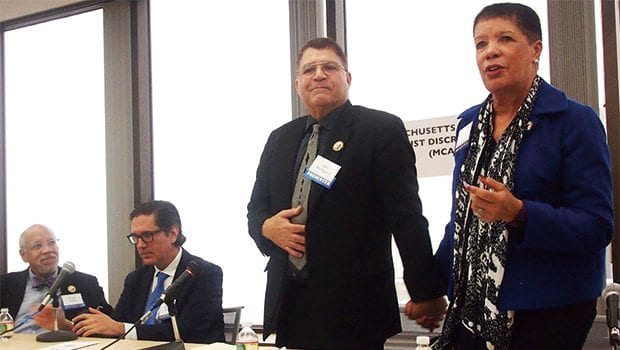MCAD marks 70th anniversary
Past commissioners reflect on progress, challenges

When he moved to Boston from out of town in the 1960s to work as a community organizer, native New Yorker Alex Rodriguez was taken aback by the racism he encountered in the northern city.
The South End neighborhood where he and his family settled was racially mixed, but when he signed his daughter up for school, he encountered a different reality.
“The blacks and Latinos went to one school, the whites went to another,” he said.
When Rodriguez was appointed a commissioner of the Massachusetts Commission Against Discrimination in 1975, he began tackling discrimination issues head-on.
“We were dealing with school desegregation, we were dealing with the police department,” he said.
Many black, Latino and Asian job applicants and employees in those racially-tense years faced discrimination. And many turned to the MCAD. Last week, MCAD commissioners past and present gathered at the agency’s Boston headquarters to mark 70 years of fighting discrimination in Massachusetts.
Panelists who served as commissioners in the 1970s, ’80s and ’90s shared the table with current Commission Chairwoman Jamie Williamson to discuss what has changed and what has not at the agency. The discussion was moderated by current MCAD commissioners Charlotte Golar Richie and Sunila Thomas George.
Rodriguez and former Commissioner Jane Edmonds, who served as MCAD chairwoman from 1977 to 1980, spoke about the tense years during service.
In the 1970s and ’80s, virtually every major city department was sued for discrimination against blacks and Latinos — the Boston School Department, the police and Fire Departments and the Boston Housing Authority were all subjected to court orders which called for mandatory hiring of blacks and Latinos to remedy court findings of discrimination against minority job applicants.
“When Mayor [Kevin] White asked ‘Why us?’ we said we thought the city of Boston was among the nation’s worst with regard to municipal hiring.”

Author: Photo: Courtesy of the MCADMCAD commissioners past and present gathered at a conference marking the agency’s 70th anniversary: Former Chairman Michael Duffy, appointed in 1991; former Commissioner Douglas Schwarz, appointed in 1997, former Chairman Chuck Walker, appointed in 1997; current Commissioner Sunila Thomas George; current Chairwoman Jamie R. Williamson; current Commissioner Charlotte Golar Richie; former Chairwoman Jane Edmonds, appointed in 1977; former Chairman Alex Rodriguez, appointed in 1985.
An evolving mandate
The roots of the MCAD go back to the post-WWII era. In 1946 Massachusetts Gov. Maurice Tobin signed a law establishing the Massachusetts Fair Employment Practice Commission. The agency began hearing cases of employment discrimination with just two employees and three volunteer commissioners.
In 1950, the agency’s name was changed to the Massachusetts Commission Against Discrimination. Its mandate was then expanded to include housing and public accommodation.
Now, 70 years after the agency’s founding, in addition to discrimination based on race and ethnicity, the commission investigates discrimination complaints based on sex, gender identity, age, disability, pregnancy status, parental leave and domestic workers. The MCAD has offices in Boston, New Bedford, Springfield and Worcester.
Former commissioner Chuck Walker, who was appointed chairman of the agency in 1997, said the caseload grew as new forms of discrimination were added to its mandate.
“Our cases just exploded,” he said. “The real challenge was that the MCAD had to educate employers,” he said.
Despite their bigger mandate, however, the agency has not received substantial increases in funding, current Chairwoman Jamie Williamson noted. The current level of funding curtails the agency’s ability to try more innovative approaches to fighting discrimination, leaving its staff often struggling to keep up with a backlog of complaints filed by those seeking redress for discriminatory behavior.
“We are woefully underfunded,” she said. “We are woefully understaffed. As much as we would like to do the work you did, we can only do the work we’re funded to do.”
MCAD under cover
Former commissioner Michael Duffy, who served as MCAD Chairman from 1991 to 1996, said he tapped law school interns to serve as undercover investigators to probe racial and age discrimination in hiring.
“We had no funding for it, but we used law students,” he said.
In one case, Duffy sent one white student and one black student to respond to a help wanted advertisement for an assistant store manager at a Brooks Brothers store in Back Bay. While the black student was told no such position was available, the white student was encouraged to apply for the position.
At the time, the store had 72 employees, 70 of whom were white and one of whom was Asian.
“There was one black employee who was a stock clerk,” Duffy said.
The case made headlines and raised awareness of discrimination in hiring.
“We did it on the cheap, with no funding,” Duffy said.
Williamson, however, said it’s less feasible to use unpaid interns in Boston today, when the average apartment rents for $2,000 a month. While the agency has an intern program, Williamson noted that very few students of color can afford to intern without compensation.
“To ask people to do civil rights work for free, while other people are getting millions to do stupid things, is appalling,” she said.
Walker, a former administrative judge with the state’s Department of Industrial Accidents, said he increased the MCAD’s use of mediation during his tenure – an approach he said had its ups and downs. Among the drawbacks are that when cases are settled without a ruling from the agency, there’s little publicity to discourage other employers from discrimination and no legal precedents are set.
But sometimes complainants don’t want to litigate their cases, Walker said, pointing to the case of a Muslim woman who was refused bus service by an MBTA driver. When her attorney asked what she wanted from the mediation process, the woman said she did not want a cash settlement.
“She wanted an apology,” Walker recalled. “She wanted total accountability.”






